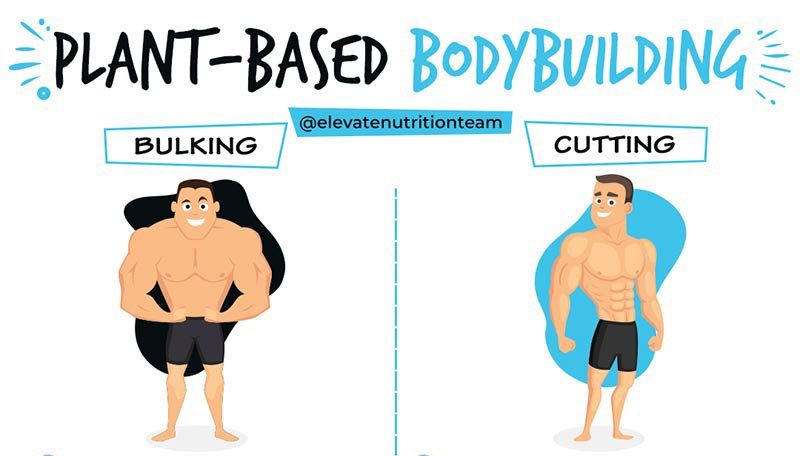When it comes to achieving your fitness goals, whether it’s losing body fat or gaining muscle mass, nutrition plays a crucial role. Nutrition strategies vary depending on your specific goals, but in this article, we will focus on the cutting and bulking phases and how you can optimize your diet to maximize results.
The Cutting Phase
The cutting phase is a period where individuals aim to reduce body fat while preserving muscle mass. This phase is popular among those looking to achieve a lean and defined physique. To successfully cut, it’s essential to create a calorie deficit, meaning that you consume fewer calories than you burn.
Calculate Your Caloric Intake
The first step in your cutting journey is to calculate your daily caloric intake. Use one of the many online calculators available, taking into account factors such as gender, age, weight, and activity level. Aim for a moderate calorie deficit – around 300-500 calories below maintenance levels – as this allows for steady fat loss while supporting muscle preservation.
Focus on Protein Intake
Protein is an essential nutrient during the cutting phase as it helps to preserve lean muscle mass, supports the metabolism, and promotes satiety. Aim to consume around 1.2-1.5 grams of protein per pound of body weight daily, spreading it across meals. Opt for lean sources such as chicken, turkey, fish, tofu, and legumes.
Control Carbohydrate Intake
In the cutting phase, it’s crucial to control your carbohydrate intake to manage insulin levels, prevent excess calorie consumption, and promote fat loss. Focus on consuming complex carbohydrates such as whole grains, sweet potatoes, and brown rice, and reduce your intake of refined sugars and processed foods.
Increase Healthy Fat Consumption
Although fats are often misunderstood, they play a vital role in the cutting phase. Consuming the right types of fat can help regulate hormone production, support brain function, and provide a feeling of satiety. Include sources of healthy fats such as avocados, nuts, seeds, and olive oil in your diet.
Monitor Micronutrients
During cutting, it’s important not to neglect the intake of essential vitamins and minerals. Opt for a wide variety of fruits and vegetables to ensure you’re getting an array of micronutrients. Additionally, consider supplements such as fish oil, multivitamins, or other specific nutrients to fill potential gaps in your diet.
The Bulking Phase
The bulking phase focuses on gaining muscle mass and strength. To accomplish this, you need to consume a caloric surplus, meaning you consume more calories than you burn. However, it’s crucial to prioritize quality when it comes to food choices during the bulking phase.
Increase Caloric Intake Smartly
When bulking, it’s tempting to consume excessive calories, but it’s important to do so wisely. Increase your caloric intake by around 200-500 calories above maintenance levels to support muscle growth without excessive fat gain. Focus on nutrient-dense foods to ensure your body receives the necessary fuel for optimal performance.
Enhance Protein Consumption
Protein is an essential macronutrient during the bulking phase as it is the building block of muscle tissue. Aim to consume around 0.8-1 gram of protein per pound of body weight daily. Lean meats, dairy products, eggs, and plant-based proteins like quinoa and tempeh are excellent protein sources.
Carbohydrates for Energy
To fuel intense workouts during the bulking phase, carbohydrates are your best friend. Focus on consuming complex carbohydrates that provide sustained energy levels. Include whole grains, oats, fruits, and starchy vegetables in your diet. However, be mindful not to go overboard and choose healthier options over processed carbohydrates.
Healthy Fats for Hormonal Balance
Like in the cutting phase, healthy fats are vital for hormone production and overall health during bulking. Include sources of healthy fats such as avocados, olive oil, nuts, and seeds. These fats not only provide calories for energy but also support proper hormone balance, aiding muscle growth.
Don’t Forget Recovery
During the bulking phase, muscle recovery is crucial for growth. Adequate sleep, hydration, and post-workout nutrition are essential. Consider incorporating protein shakes or supplements that contain key amino acids like BCAAs to promote muscle repair and growth.
Conclusion
Nutrition is a critical factor in achieving your fitness goals. Whether you are in the cutting or bulking phase, it’s important to tailor your diet accordingly. For cutting, create a moderate calorie deficit with a focus on protein intake, controlled carbohydrates, and healthy fats. In the bulking phase, consume a smart caloric surplus, enhance protein consumption, fuel with carbohydrates, and prioritize healthy fats while prioritizing recovery. By following these nutrition strategies, you’ll optimize your cutting and bulking phases for maximum results in your fitness journey.

